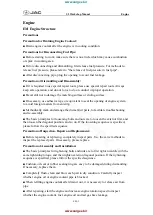
CONTROLS AND EQUIPMENT
1- 64
SSAR014A
B750B02Y-AAT
Using a cellular phone or a two-way
radio
When a cellular phone is used inside the vehicle,
noise may be produced from the audio equip-
ment. This does not mean that something is
wrong with the audio equipment. In such a case,
use the cellular phone at a place as far as
possible from the audio equipment.
CAUTION:
When using a communication system such a
cellular phone or a radio set inside the vehi-
cle, a separate external antenna must be
fitted. When a cellular phone or a radio set is
used with an internal antenna alone, it may
interfere with the vehicle's electrical system
and adversely affect safe operation of the
vehicle.
WARNING:
Don't use a cellular phone when you are
driving. Stop at a safe place to use a cellular
phone.
SSAR013A
o Station Swapping - As an FM signal weak-
ens, another more powerful signal near the
same frequency may begin to play. This is
because your radio is designed to lock onto
the clearest signal. If this occurs, select
another station with a stronger signal.
o Multi-Path Cancellation - Radio signals being
received from several directions can cause
distortion or fluttering. This can be caused by
a direct and reflected signal from the same
station, or by signals from two stations with
close frequencies. If this occurs, select an-
other station until the condition has passed.
o Fading - As your car moves away from the
radio station, the signal will weaken and sound
will begin to fade. When this occurs, we
suggest that you select another stronger sta-
tion.
o Flutter/Static - Weak FM signals or large
obstructions between the transmitter and your
radio can disturb the signal causing static or
fluttering noises to occur. Reducing the treble
level may lessen this effect until the distur-
bance clears.
















































